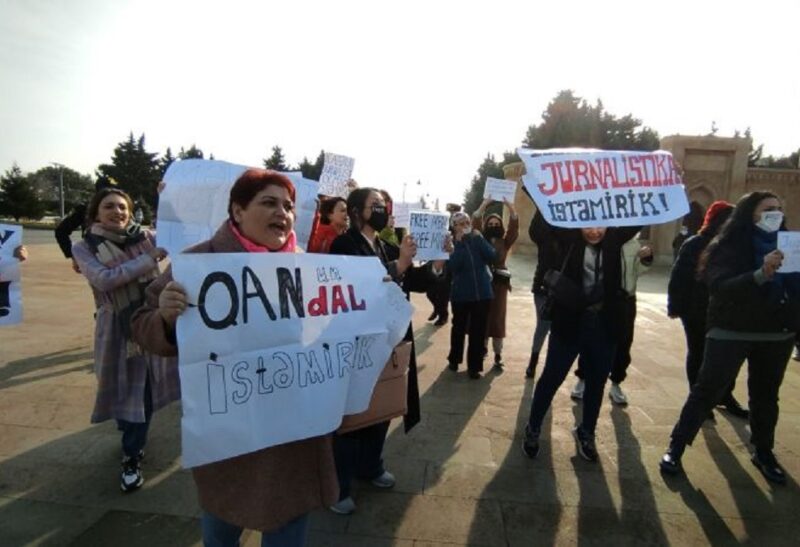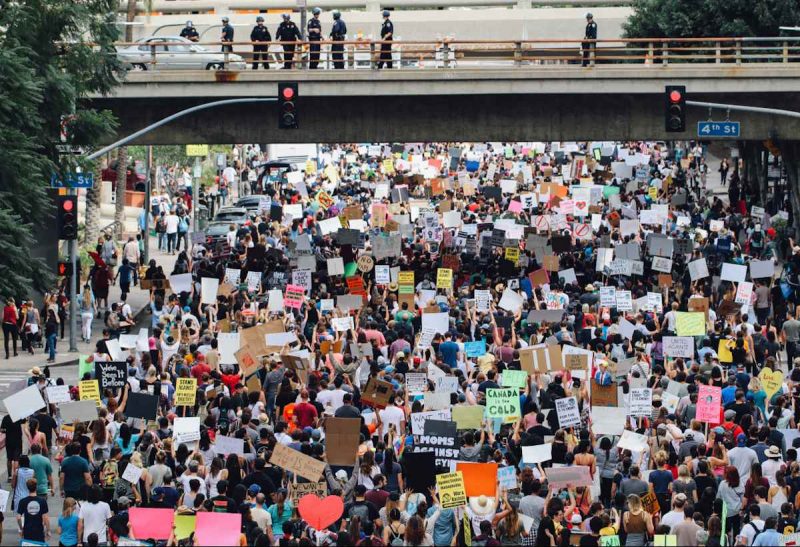
From 25 November, the International Day for the Elimination of Violence against Women, to 10 December, Human Rights Day, the
16 Days of Activism against Gender-Based Violence Campaign
is a time to galvanize action to end violence against women and girls around the world. This year, the UNiTE Campaign will mark the 16 Days of Activism against Gender-Based Violence under the overarching theme, “
Leave No One Behind: End Violence against Women and Girls
”— reflecting the core principle of the transformative 2030 Agenda for Sustainable Development.
As part of the 16 Days of Activism, Meydan TV is publishing an in-depth look at human trafficking in Azerbaijan. This is the final part of a four-part series. Part three can be read
here
.
PART FOUR
Gender, Corruption, and Civil Society
Activists in Azerbaijan say that stories like Khayala’s do not have to represent the future of Azerbaijani women and girls. Experts interviewed by Meydan TV identified three key areas where changes could reduce exploitation of women:
- Promoting gender equality
- Dismantling systemic corruption
- Reestablishing civil society in Azerbaijan
GENDER EQUALITY

The United Nations Committee on the Elimination of Discrimination Against Women
expressed concern in a 2015 report
about the limited access that rural women in Azerbaijan have to economic opportunities, social and health services, and participation in political and public life. Khayala’s story, in which she was denied an education and forced into marriage with an abusive husband, exemplifies how gender inequality can lead to human trafficking.
A women’s rights specialist who asked to remain anonymous told Meydan TV in an interview that increasing women’s political participation is critical to improving their status in Azerbaijan. Women must be present in decision-making processes in order for their needs and rights to be prioritized in policymaking. Harmful gender stereotypes keep women out of the political sphere and increase their risk of being exploited.
Another activist who spoke anonymously with Meydan TV because of the political nature of her comments said that women’s voices are further silenced in Azerbaijan by a lack of democratically elected representatives. She said that many of the women who hold higher positions in the government of Azerbaijan are not elected but strategically appointed by male elites to toe the ruling party line and maintain the status quo. Freedom House, an international nonprofit organization, calls Azerbaijan a “deeply authoritarian state” in its
2016 Nations in Transit Report
. The report states that political power in Azerbaijan has been consolidated by President Ilham Aliyev. He directly appoints regional leaders and decision-makers in the government.
In 2009, activist and journalist Arzu Geybullayeva conducted research on behalf of the
European Stability Initiative (ESI)
on the trafficking of women and domestic violence in Azerbaijan. She interviewed members of parliament, including MP Hadi Rajabli, about legislation that affects women. He is documented as saying, “Why did the Gender Equality Law pass so easily? Well, it came with the President’s signature.” Geybullayeva also asked about the difficulty in passing the Law on Domestic Violence. Because of cultural bias, “no one dared take it to the parliament general assembly. None of the women did. They asked me to. I said no, too,” Rajabli stated in the report.
Addressing the lack of economic independence of women in Azerbaijan is also an important step in moving towards gender equality and preventing human trafficking. In the same report for ESI, Azerbaijani representatives from the American Bar Association (ABA) in Baku told Geybullayeva in an interview that the traditional thinking of men as breadwinners and women as caregivers “clouds the thinking of people in Azerbaijan.” Instead of fostering independence and prioritizing education for their daughters, families tend to arrange marriages for them as early as possible. Women do not have equal access to economic activity and may become exposed to exploitative practices, particularly during times of economic hardship.
U.S. Ambassador-at-Large Luis CdeBaca, the former head of the State Department’s Office to Monitor and Combat Trafficking in Persons, wrote in
Women on the Frontline of Peace and Security
, “So long as women still struggle for equality and opportunity, so long as women and girls still leave home in search of a better life for themselves and their families…modern slavery will remain a threat, whether it manifests in the sex industry or in otherwise valid forms of labor.”
ANTI-CORRUPTION

Corruption is a well-documented, longstanding problem in Azerbaijan. While the government has ostensibly taken measures to improve its policies regarding human trafficking, experts contend that these amendments do not address what the
U.S. State Department’s 2015 Trafficking in Persons Report
refers to as pervasive corruption. According to the report, corruption in Azerbaijan limits the effectiveness of anti-trafficking policies and enforcement. For example, local police have been accused of accepting bribes from brothels involved in sex trafficking.
According to Alovsat Aliyev, former director of the Azerbaijan Migration Center, in addition to taking bribes and turning a blind eye to criminal activities, some government officials and police are directly involved in the exploitation of women and act with de facto impunity. In
2009
, there were several documented claims by victims of human trafficking that they had been kidnapped by Azerbaijani police and forced into prostitution. “An objective investigation happens until it is discovered that a government official is involved. Then the investigation stops,” Aliyev told Meydan TV in a video interview.
A
cable published on Wikileaks
in 2010 from the U.S. Embassy in Baku to several other embassies and offices, including that of then U.S. Secretary of State Hillary Clinton, describes a lack of political will in the Ministry of Internal Affairs of Azerbaijan to investigate the widespread, high-level corruption that contributes to human trafficking.This information collected by the U.S. State Department was not included in the final, publicly available version of the Trafficking in Persons report that year. Corruption expert Sarah Chayes of the Carnegie Endowment for International Peace
published her research
earlier this year on how this high-level corruption in Azerbaijan is driven by the authoritarian structure and institutional weakness of the government.
An Azerbaijani human rights researcher living outside of Azerbaijan in order to continue his work free from persecution described the government’s structure as
“one window with 40 holes.”
He told Meydan TV in an informal interview that when all efforts to address an issue are housed under a single government body, this creates an ideal environment for corruption and impunity. There is no oversight mechanism, no checks and balances. In Azerbaijan, all components of the government’s anti-trafficking work are subordinated to the Ministry of Internal Affairs.
Vilayat Eyvazov embodies this concentration of power in his multiple roles as the National Coordinator for the Fight Against Trafficking in Persons, the First Deputy Minister of the Ministry of Internal Affairs, and the Police Lieutenant-General.
He is referred to in the report
Azerbaijan’s Dark Island: Human Rights Violations in Nakhchivan
as one of the “officials in top posts…of Nakhchivan origin notable for their personal loyalty to the Aliyev family.”
Trafficking expert Matanat Azizova said in an interview with Meydan TV that survivors of human trafficking cannot be adequately cared for and rehabilitated under the current system. Nor can true justice be served until systemic corruption in the Azerbaijani government is eradicated.
CIVIL SOCIETY

The situation of human rights in Azerbaijan has been rapidly deteriorating in recent years. According to
Freedom House
, “Azerbaijan’s civil society was decimated by the 2014 wave of purges and arrests” of human rights defenders, activists, and journalists. They continue to face persecution.
According to international human rights organizations, the government of Azerbaijan has specifically targeted journalists and activists who turn a spotlight on the government’s involvement in human trafficking.
Amnesty International
issued a report in 2012 calling for the release of then political prisoner Taleh Khasmammadov. According to the report, Khasmammadov’s arrest and subsequent imprisonment was politically motivated, retribution for publishing articles alleging that local police were colluding with criminal groups. One of his articles reported on a 17-year-old female who committed suicide after being trafficked.
International organizations and other state governments that monitor human trafficking depend on input from civil society organizations, journalists, and human rights activists. When their activity is restricted, violations go uninvestigated. Meydan TV requested comments from the U.S. Embassy in Baku on its annual Trafficking in Persons Report. A representative from the Embassy replied via email, “The report relies heavily on the information we receive from year to year. As we assembled this year’s report, we did not hear of any accusations or incidents of police complicity in trafficking, as we had when compiling the report in previous years.”
In August of last year, Sport for Rights Coalition and other international NGOs issued a
joint statement
that, “Azerbaijani authorities have unleashed a new wave of repression to silence critical voices.” They are calling upon the international community to take “concrete action to hold the Azerbaijani government accountable for its human rights obligations.”
In an interview with Meydan TV, an Azerbaijani activist asked,
“Without human rights, how can there be women’s rights?”
Meydan TV thanks the human rights defenders, experts, activists and journalists both inside Azerbaijan and abroad who contributed to this article.



